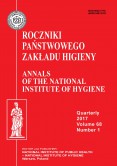Rocz Panstw Zakl Hig 2001, 52(4): 337-345
Wpływ niektórych inhibitorów ADH na aktywność mikrosomalnego systemu utleniania alkoholi in vitro
[Effect of some ADH inhibitors on microsomal alcohol oxidizing system activity in vitro]
STRESZCZENIE
Leczenie zatruć metanolem opiera się między innymi na zahamowaniu utleniania alkoholu do jego toksycznych metabolitów poprzez zastosowanie etanolu lub 4-metylopirazolu. Wciąż jednak poszukuje się nowych rozwiązań w terapii zatruć metanolem. W tym celu dokonano oceny wpływu na aktywność mikrosomalnego systemu utleniania alkoholi (MAOS) wybranych inhibitorów dehydrogenazy alkoholowej (ADH) w reakcji z metanolem jako substratem. Oznaczenie aktywności MAOS przeprowadzono in vitro przy pH 7,4 i temp. 370C, metodą spektrofotometryczną, mierząc stopień utlenienia metanolu. Ilość powstającego formaldehydu oznaczono metodą Nash’a. Źródłem enzymu były skrawki wątroby ludzkiej pobrane post mortem. Wyniki wskazują, że aktywność MAOS jest hamowana w różnym stopniu przez: 4-metylopirazol (4-MP), amid kwasu izowalerianowego, cymetydynę, DMSO, EDTA, o-fenantrolinę, pirazol i teofilinę przebadane w stężeniach 0,01 mmol/l, 0,10 mmol/l i 1,00 mmol/l. Natomiast błękit metylenowy, acetylo-L-karnityna i penicylamina są aktywatorami w procesie utleniania metanolu katalizowanym przez MAOS. 4-MP, który odgrywa istotną rolę jako odtrutka w intoksykacji metanolem nie jest dość skutecznym inhibitorem MAOS. Najefektywniejszym inhibitorem enzymu okazał się EDTA we wszystkich przebadanych stężeniach.
ABSTRACT
The treatment of methanol intoxication usually focuses on prevention of methanol conversion to its toxic metabolites due to administration of ethanol or 4-methylpyrasole (4-MP). Nevertheless there is a need for new measures treatment of methanol intoxication. For this reason the influence of some alcohol dehydrogenase inhibitors on the activity of microsomal alcohol oxidising system (MAOS) with methanol as a substrate was assayed. In the present study MAOS activity was measured spectrophotometrically in vitro at physiological pH 7.4 and 370C, assaying the degree of methanol oxidation. The quantity of arising formaldehyde was measured according with the method of Nash. The source of enzyme was hepatic slices. Our results have shown that MAOS activity was inhibited to different extents by: 4-MP, isovaleric amide, cimetidine, DMSO, EDTA, o-phenantroline, pyrasole and thephylline at concentrations of 0,01 mmol/l, 0,10 mmol/l 1,00 mmol/l. And methylene blue, acetyl-L-carnityne and penicillamine increase MAOS activity in the process of methanol oxidation. In summary, 4-MP which plays an important role as an antidote in methanol intoxication was not an effective MAOS inhibitor. EDTA was found to be a highly effective inhibitor at all investigated concentrations.
Downloads: 2263


